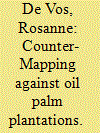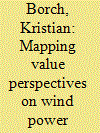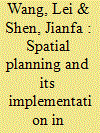|
|
|
Sort Order |
|
|
|
Items / Page
|
|
|
|
|
|
|
| Srl | Item |
| 1 |
ID:
126505


|
|
|
|
|
| Publication |
2013.
|
| Summary/Abstract |
The effective delivery of a sustainable energy future raises many challenges in relation to energy distribution where a new understanding of spatial planning is needed in relation to energy production, consumption and storage. Understanding the emergent low carbon energy economy in terms of its production, distribution and consumption characteristics has prompted a deliberate spatial planning interest. This paper examines issues relating to spatial planning, regulation, political legitimacy and accountability in the current and future systems for energy distribution. In particular it examines the Beauly Denny public inquiry in Scotland as a case study in terms of demonstrating the changing state-market-civil relations in an energy transition context with differentiated values and interests. The case study highlights implications for the regulation in the public interest of highly contested spaces, places and development schemes, together with a synopsis of government structure and change that is influencing the future of spatial planning and energy distribution in particular.
|
|
|
|
|
|
|
|
|
|
|
|
|
|
|
|
| 2 |
ID:
162545


|
|
|
|
|
| Summary/Abstract |
This paper explores how villagers in Sambas District of West Kalimantan, Indonesia, attempt to protect their land rights against oil palm companies by engaging in mapping and spatial planning, in the context of the implementation of Indonesia's 2014 Village Law. Drawing on theoretical debates about counter-territorialization and counter-mapping, this paper considers how villagers use the Village Law to legitimate control over their territory. Although village-level spatial planning and mapping initiatives do not guarantee that land rights will be protected in the long term, spatial plans and maps can serve as leverage in negotiations with oil palm companies and government officials. Moreover, mapping and spatial planning help to organize people and boost discussions about land rights and different aspirations for land use. Proactive village-level spatial planning is necessary to find ways to maintain pre-existing ways of using land, and to counter notions of empty land, available for companies to claim.
|
|
|
|
|
|
|
|
|
|
|
|
|
|
|
|
| 3 |
ID:
111879


|
|
|
|
|
| Publication |
2012.
|
| Summary/Abstract |
For a long time, China has been focusing primarily on pursuing economic growth, with less concern about social and environmental development issues. This may make China's development unsustainable. In contrast to its current economic-oriented approach predominated by economic growth, this research note presents a newly proposed approach of 'major function-oriented zone' (MFOZ) that is designed by our research team and is largely accepted by the central government and incorporated into its 12th Five-Year Plan. This approach tries to rationalise China's regional development and insists that each region should have its unique functions to perform, determined by its own characteristics, conditions and requirements. With this approach, the central government is able to monitor and coordinate regional and local developments, and hence the 'Planning of MFOZ' is seen by the central government as a tool to steer spatial arrangements for the country's long-turn sustainable development.
|
|
|
|
|
|
|
|
|
|
|
|
|
|
|
|
| 4 |
ID:
162305


|
|
|
|
|
| Summary/Abstract |
Social acceptance of wind power is a complex matter, and national public interest does not necessarily translate into local public interest. If community concerns is disregarded in public spatial planning and the private development of wind power projects, the expected increase in the production of wind power energy will be jeopardized. Value propositions for installing wind farms in a community often consider only national policy targets, end users and those organizations that make a profit on installing, running or owning a wind turbine power plant. In many cases, the impact of technologies on society is underestimated, especially the impact on those actors who are influenced by technological change but without perceived benefit. This paper applies a value framework to systematically analyse the perceived value of the National Test Centre for Large Wind Turbines in Denmark, considering different stakeholder dimensions of acceptance (socio-political, market and community) from four perspectives (economic, psychological, sociological and environmental) before arriving at some policy recommendations on how to incorporate community values when siting wind turbines.
|
|
|
|
|
|
|
|
|
|
|
|
|
|
|
|
| 5 |
ID:
079666


|
|
|
|
|
| Publication |
2007.
|
| Summary/Abstract |
The principal argument advanced in this paper is that spatial planning in the Solomon Islands has failed to deliver any substantive benefits and is therefore in urgent need of reform. The present model of planning, derived from a combination of colonial practice and legislation originating in the UK, does not add much, if any, value to the development process. The poor quality of planning in the Solomons cannot be seen in isolation. There are similar systems in use throughout much of the Commonwealth and anecdotal evidence suggests that the failings are widely duplicated. The Solomon Islands only appear exceptional in the extent to which other government systems have demonstrably broken down, following the 'Ethnic Tension' of 2000 - 03. The Regional Assistance Mission to the Solomon Islands (RAMSI) provides a unique opportunity for a review of the way in which planning operates. A number of issues are identified which any reformed system must address
|
|
|
|
|
|
|
|
|
|
|
|
|
|
|
|
| 6 |
ID:
127164


|
|
|
|
|
| Publication |
2014.
|
| Summary/Abstract |
This article examines a form of regulatory capture that occurs when significant ambiguity exists regarding the environmental protection standards for new types of activities in the marine environment. To begin with, there is little research that categorizes the typologies of regulatory capture despite the ubiquity of the phenomenon. After a discussion of theoretical approaches to regulatory capture, I describe the operative definition and theory appropriate to the situation related to authorization of oil and natural gas production in Israel following the discovery of large offshore reserves in 2010. This approach, embodying several facets of existing typologies, is applied to decisions made authorizing construction of the Gabriella offshore exploratory drilling platform. The analysis highlights the nature of capture in the absence of clear agency jurisdiction over new activities located in offshore environs organized as temporal and spatial "vacuums". I conclude that comprehensive marine spatial planning would result in less capture and the development of more capture-resistant regulations.
|
|
|
|
|
|
|
|
|
|
|
|
|
|
|
|
| 7 |
ID:
147602


|
|
|
|
|
| Summary/Abstract |
Spatial planning is considered as an important governance instrument to cope with uncoordinated regional problems. This article explores the underlying rationale and mechanisms of spatial planning in provincial China through a case study of the Jiangsu region along the Yangtze River (JSYR) plan. It reveals that the practice of the JSYR plan reflected the changing strategic expression of the provincial government on regional development and was shaped by the contests between provincial and municipal governments. The planning policies and provincial economic and political mobilizations formed as a spatial policy framework that promoted plan implementation at the municipal level. The plan achieved development goals of overall economic growth and infrastructural construction, but it was ineffective regarding development control and regional coordination. The case study also sheds light on the dynamic relationship between provincial and municipal governments, and the structural problems of spatial governance under economic decentralization and political centralization in China.
|
|
|
|
|
|
|
|
|
|
|
|
|
|
|
|
| 8 |
ID:
152162


|
|
|
|
|
| Summary/Abstract |
Which bodies of knowledge and which paradigms of thinking shape spatial plans? A content analysis of three textbooks on town planning shows that on the one hand, planning standards, models, and paradigms for technical modernisation are well developed, while on the other hand, environmental planning and preservation of culture have been identified as current challenges. Introductions to town planning have been found to shift between routinely presenting established approaches and exploring solutions or technical approaches to challenges to town development.
|
|
|
|
|
|
|
|
|
|
|
|
|
|
|
|
|
|
|
|
|